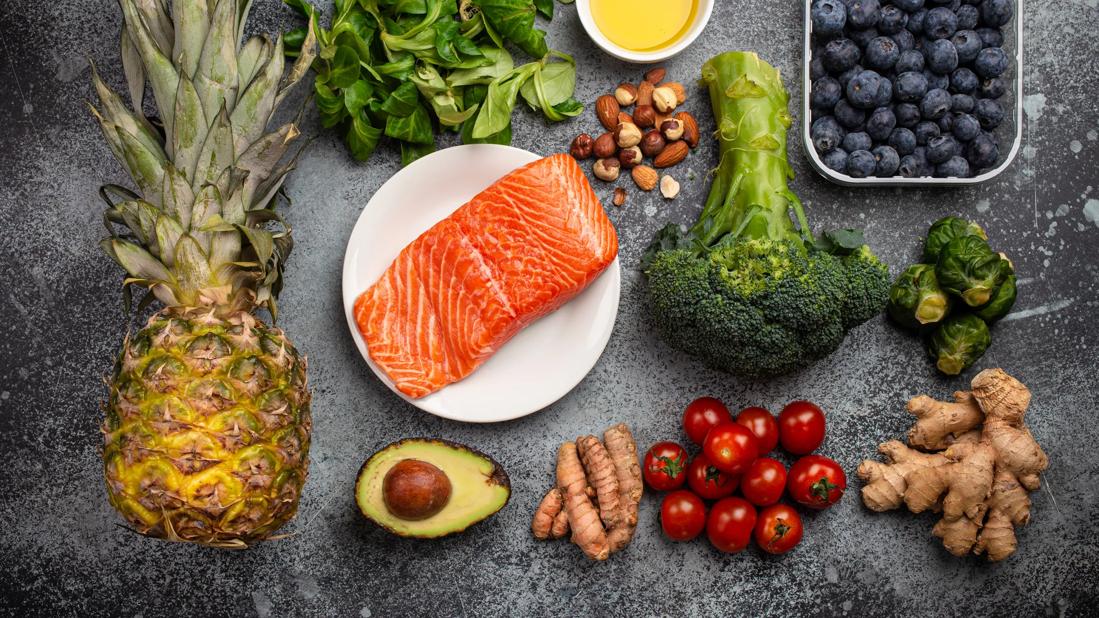Adding foods like fruits, vegetables, fatty fish and whole grains to your diet may help soothe inflammation

Image content: This image is available to view online.
View image online (https://assets.clevelandclinic.org/transform/77f10e3a-5794-4d72-8812-023df50d48ef/anti-inflammatory-diet-1299079242)
Assorted anti-inflammatory foods, including fish, veggies, fruits, nuts and oil
An anti-inflammatory diet may help reduce chronic inflammation — a prolonged response to how your body handles danger. Chronic inflammation can damage your heart, brain and other organs. And it plays a role in nearly every major illness, including cancer, heart disease, Alzheimer’s disease and depression.
Advertisement
Cleveland Clinic is a non-profit academic medical center. Advertising on our site helps support our mission. We do not endorse non-Cleveland Clinic products or services. Policy
So, how can the foods you eat contribute to how you feel? Registered dietitian Julia Zumpano, RD, LD, explains.
The food we eat — and don’t eat — can soothe and even prevent inflammation by quashing your body’s inflammatory responses.
The idea is that what you eat plays a role in how you feel. But because everyone’s inflammatory triggers are different, there’s no one-size-fits-all anti-inflammatory diet.
“The term ‘anti-inflammatory diet’ doesn’t refer to a specific diet regimen but to an overall style of eating,” Zumpano clarifies.
But she does credit two eating styles that have been shown to help with inflammation: the Mediterranean diet and the DASH diet.
“Positive research reports that these diets are successful in reducing inflammation, as well as cholesterol, weight, blood pressure and blood sugar,” she adds.
The health benefits of an anti-inflammatory diet include:
The biggest hint that your anti-inflammatory diet is working is if you start feeling better, so keep an eye on your symptoms and look for positive changes to your health.
Advertisement
“There are a lot of different ways your body can react to an anti-inflammatory diet,” Zumpano notes.
Video content: This video is available to watch online.
View video online (https://cdnapisec.kaltura.com/p/2207941/sp/220794100/playManifest/entryId/1_zlsxt967/flavorId/1_5f3sgelj/format/url/protocol/https/a.mp4)
Registered dietitian Julia Zumpano explains how you can begin an anti-inflammatory diet.

Image content: This image is available to view online.
View image online (https://assets.clevelandclinic.org/transform/80a5974e-44de-4f9e-9e89-b6d9c506ed80/anti-inflammatory-diet-infographic)
If you want to follow an anti-inflammatory diet, focus on whole foods and minimally processed foods, says Zumpano.
An example of an anti-inflammatory food list may look something like:
In short, if you can find it in nature, it’s probably a whole food.
On the other hand, there are certain foods you should avoid or limit, including:
Even if you don’t have a chronic condition, you can experience inflammation when you eat foods that you’re sensitive to.
“When you have an immune response to a food, your antibodies rise, which can cause inflammation,” Zumpano explains. “Your body basically sees that food as a foreign body and starts working against it.”
Even so-called “healthy” snacks, like granola bars, trail mix and baked chips, can have a lot of processed ingredients, including added sodium and sugar.
“There’s no real nutritional benefit to them, so you’re not lacking anything when you cut them out,” she adds.
Everyone’s inflammatory triggers are different, so there are a few reasons you might experience inflammation.
For example, if you’re living with a chronic health condition, you may be living with chronic inflammation, too. Conditions associated with inflammation include:
“We know of some general associations,” Zumpano says. “Refined starches and processed meats aren’t good for people with heart disease (or anyone); gluten and dairy can further inflame bowel disorders; and nightshades can be inflammatory for arthritis. But each person needs to find their personal triggers.”
Advertisement
Foods that cause inflammation in one person might not cause it in others — like how you can enjoy the occasional slice of pizza without issue, while eating a slice causes severe inflammation in your friend who has a gluten sensitivity.
Keep in mind that although you may not experience a physical sign of inflammation, all processed foods can lead to internal inflammation. So, keep them to a minimum, even if you don’t have a particular sensitivity.
Here are some guidelines to eat in a way that reduces the likelihood of inflammation:
Advertisement
Following an anti-inflammatory diet like the Mediterranean diet and the DASH diet may help you determine how your body reacts to certain foods. And by cutting out certain inflammatory foods, you may see results as soon as two to three weeks after eliminating that food from your diet.
“This can be very encouraging and motivating,” Zumpano reassures. “People often tell me that they never realized how bad they felt until they changed their diet and began to feel so much better.”
Advertisement

Sign up for our Health Essentials emails for expert guidance on nutrition, fitness, sleep, skin care and more.
Learn more about our editorial process.
Advertisement
Raspberries are packed with nutrients that can reduce inflammation and prevent chronic diseases
Cut back on foods made with added sugars, trans fats, refined carbs, omega-6 fatty acids and processed meats
Keto can reduce blood sugar, but that doesn’t mean it’s right for everyone
Cravings are a natural response to hormonal changes, but giving into them may make you feel worse
People with PKU need to avoid high-protein foods, like meat, dairy, legumes and whole grains
Alternating between periods of eating and fasting may benefit your health
This plant-based eating plan focuses on lowering cholesterol, making it a great companion to the Mediterranean diet
Eating a healthy diet, reducing stress, and focusing on exercise and sleep can help keep your digestive system in top form
Although it could be used as a moisturizer, this new trend is not recommended
Communicating clear limits helps protect your time, energy and emotional well-being
High cholesterol can be genetic, but testing and treatment can lower your heart disease risk